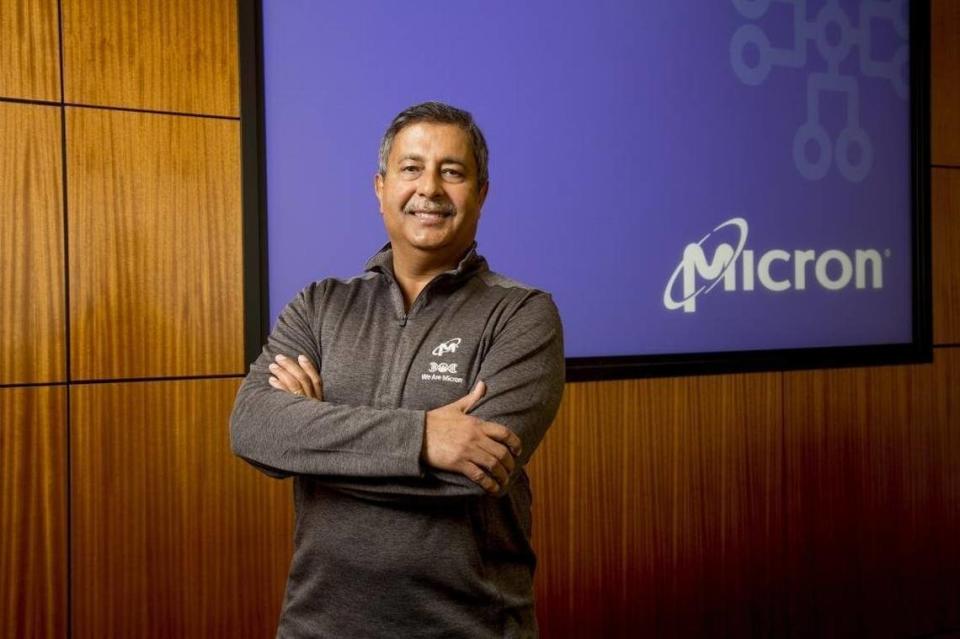Biden signs semiconductor-subsidy bill. What Micron now says it will do with the help
Boise-based Micron Technology Inc. says it will invest $40 billion in memory manufacturing in the U.S., thanks to the semiconductor-industry subsidy President Joe Biden signed Tuesday.
The investment will create about 40,000 U.S. jobs, including “approximately 5,000 highly paid technical and operational roles at Micron” and 35,000 “support and community jobs,” Micron said in a news release and a video. It will be the biggest investment in memory manufacturing in U.S. history, the company said.
“This legislation will enable Micron to grow domestic production of memory from less than 2% to up to 10% of the global market in the next decade, making the U.S. home to the most advanced memory manufacturing and R&D in the world,” CEO Sanjay Mehrotra said in the release.

Micron told the Idaho Statesman on Friday that it plans a “mega fab” in the U.S. that would employ 3,000 to 5,000 people and lead to 10,000 new jobs in all, including non-Micron jobs. But it hasn’t said whether it would build that fab in Boise or elsewhere.
Fab is short for semiconductor fabrication, the manufacturing plants where DRAM, dynamic random-access memory, and NAND flash memory are produced. Micron is the only manufacturer of DRAM in the U.S.
Micron has research-and-development fabs at its Boise headquarters, but its only U.S. fab making chips for sale is in Virginia. The rest of its chips are made overseas, mostly in Asia.
On Tuesday, Mehrotra and Boise Mayor Lauren McLean traveled to the White House to witness the signing ceremony for the CHIPS and Science Act. Micron thanked the Biden administration and Congress for the law. The city paid for McLean’s $1,513 trip from its economic development budget, a spokesperson for McLean said.
Asked about criticism of the bill’s taxpayer-funded subsidy of one industrial sector, Mehrotra told CNBC’s “Squawk Box” that the bill “is really leveling the playing field” and is important for national security. The U.S. depends heavily on foreign semiconductor manufacturing, including in Taiwan, the independent island nation that China claims as its own and is the center of rising tensions between the U.S. and China.
“Over the past couple of decades, foreign countries, especially in Asia, have invested hundreds of billions of dollars in providing incentives to bring semiconductor manufacturing to their shores,” Mehrotra said. “This is what has resulted in 37% of manufacturing of semiconductors at the turn of the century to now being really 12% of semiconductor manufacturing here in the U.S. This is what we have to reverse.”
Production “is 35% to 45% cheaper” in Asia than in the U.S., Mehrotra said.
Micron said it is completing specific U.S. expansion plans and will share more about them “in the coming weeks.”
The company previously said it would invest $150 billion worldwide in manufacturing and R&D over the next decade. It was not immediately clear if the remaining $110 billion would all be invested abroad.
Micron is Idaho’s largest for-profit employer of Idahoans, with about 7,000 workers in the Treasure Valley, mostly at its headquarters on Federal Way in Southeast Boise. It is the second-largest U.S. semiconductor manufacturer after Intel, which does not make memory chips.
Boise City Hall reporter Ian Stevenson contributed.
Boise mayor to go to Biden’s signing of bill that’ll help Micron build a big plant. Why?
Congress passes semiconductor subsidies. Will Boise’s Micron expand in Idaho?
Biden’s commerce secretary says Congress must pass subsidy fast to help Micron, nation
With sales tax exemption from the Idaho Legislature, will Micron expand its Boise campus?

